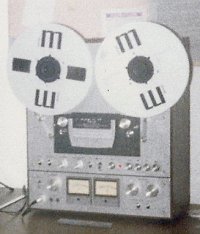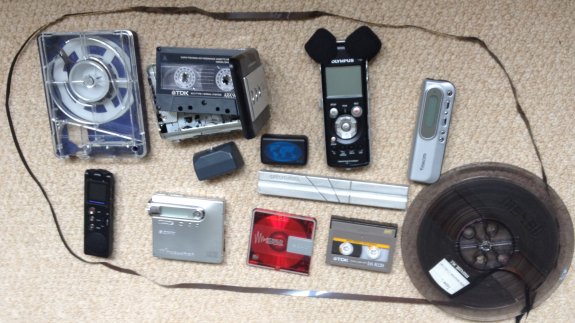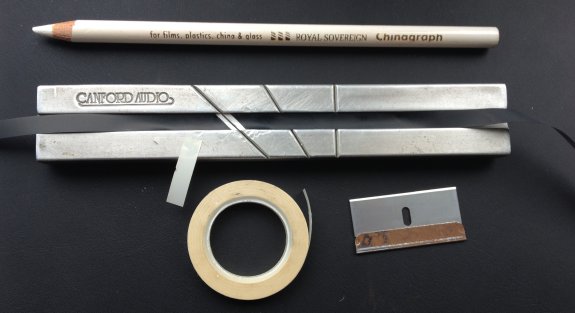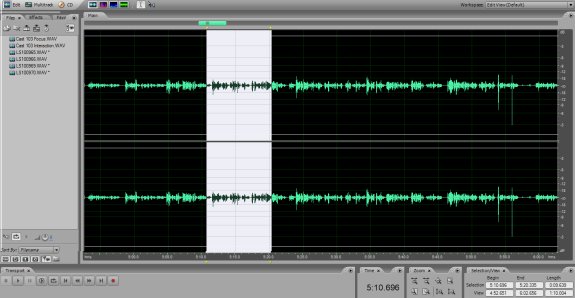 In recent weeks, the subject of recording amateur radio exchanges has come up several times, both on and off line. Discussion of ‘taping’ has moved one of the regulars to share a few words on the subject, which we’ll come to shortly.
In recent weeks, the subject of recording amateur radio exchanges has come up several times, both on and off line. Discussion of ‘taping’ has moved one of the regulars to share a few words on the subject, which we’ll come to shortly.
As some of you will know, to cover myself, I now have to keep an audio record of what I say on GB3DA… this follows a campaign of emails about comments made by some of the regulars that join out net. It’s also the reason why I now have to read the slightly tedious disclaimer over-the-air each Monday… Given that, to quote the oft-used phrase, “it’s only a hobby”, it’s a shame – but that’s where we are. Anyway…
Three weeks ago, one of the Monday Night Net regulars pointed out that, even though we refer to “taping” the Monday Night Net, these days, we’re all recording digitally… no tape. That’s certainly the case here – all recorded audio is stored as compressed mp3 files… but one regular got in touch to let us know that he records our net for us on traditional analogue tape – and he brought a smartphone video of a net, playing back on open-reel, to show us.
Is tape obsolete?
The prompt for this post was a short article submitted to us by Ant M0ORF, a regular Monday Night Net listener and Skills Night attendee:
Is “taping” obsolete?” Not quite. I have recorded the Essex Ham Monday Night Net using my open real 1/4″ all-valve tape recorder. I might also use, as it is very much smaller and fit in my shack, a 1969 voice recording Dictaphone which uses a micro cassette with 3.81mm wide tape. In my cupboard, I have a Dictabelt system, but the blue plastic belts are a bit fragile, if not a fire risk! Essex Ham could have a belting net.
The future? L. Moxon G6XN has written “the possibilities of using frees themselves as antennas achieved by feeding energy into the tree via a toroidal coil wrapped around the trunk… particularly useful in wet jungles – up to 22dB better than conventional whip antennas…”
Perhaps with global warming, Essex Hams will have LATTES in future… “Large Array Tree Transmitting Experimental Systems”
Thanks Ant!
Recording over the years
This article prompted me to have a look in the cupboard to see what I’ve used to record in the past – and here’s a photo of some of the kit that I’ve used over the years – Obviously this excluded smartphones and digital cameras, which also record audio. I’m guessing some of these items may be familiar to a few of you… feel free to use the comments section if you recognise any of this!

Back in the 80s and 90s, I worked in broadcast radio, and just about everything was on analogue tape, so I’m no stranger to recording, storing and editing tape… indeed, I still have the editing kit and very occasionally get to use it. I also have reels of tape of various editing projects I’ve completed over the years. One of my former colleagues, Essex FM presenter Chris Best gave me the nickname “Wizard of the Blade”, as I was the Sharpest Splicer in the West.

These days, I still do a heck of a lot of audio editing, mostly for the the little podcasting project that Kelly M6KFA and I work on, FrequencyCast, in fact instead of typing this, I should be working on the next show… Here’s a screenshot of the upcoming show in progress:

That’s all for now. Press ‘Stop’ and ‘Rewind’ now…
Pete M0PSX
Comments?
Anyone got any comments on the subject of taping, or their experiences of recording audio over the years? Please add a comment below….


Good feature but sad that you feel the need to record yourself for protection because people are recording you and whining.
I don’t know about it’s only a hobby, maybe the people complaining should
try “get a life” as it is much more apt i’m afraid.
I can think of much better things to do than tune around listening for people to complain about but I suppose these people should be pitied as they obviously have no life or even more sadly no friends.
Other than that a nice article bringing back memorys, it’s been so long I forget that the term taping used to have a different meaning.
Thanks for the support Richard – Much appreciated. The aim was to bring back a few memories of old recording formats – happy days of editing tape!
Not taping, but fond memories of streaming, and the days of internet radio when we were all still on dialup modems. I remember broadcasting live to the handful of listeners my 56k modem could support, in 16kbps mono MP3 format.
Other listeners would re-broadcast the stream. The lag was in the region of 30 seconds to a few minutes, but it was live enough for us.
When the world of video came on board, we were broadcasting gigs in RealVideo format at the lofty bitrates of 32 kbps for audio and 56kbps for video.
Fast forward to today, and the ISS can beam realtime HD video to earth (http://www.ustream.tv/channel/iss-hdev-payload), and I can stream it live and wirelessly in the nearest café. Wonderful!
I had a Fostex R8 reel-to-reel hooked up to an 8 track mixing desk. The quality was ok for demo tapes and home recording. Today’s digital recorders are excellent and I would never buy tape again. That said, I get nostalgic about the old tape systems. The days of the ‘mix tape’ are surely gone forever.
Yes – I remember some of the Fostex kit – used one of their mixers for a few years… happy days
I thought it was Illegal to record conversations without the other persons knowledge???
As I understand it, there’s no problem recording amateur radio conversations.
When it became apparent that to protect our participants, we had to start recording our nets, I looked into this in some depth. Here’s what I found:
Amateur radio conversations fall into the “General Reception” category, so listening (and recording) is allowed. Interception of conversations not intended for you or not for “general reception”, such as mobile phone calls, emergency services radio traffic, etc without permission is in most cases, illegal. (Source: Wireless Telegraphy Act 1949)
As for recording conversations, it’s even legal to record a phone conversation you have with another person, without that person’s permission – provided it’s for personal use and you don’t share it with a third party. (Source: Regulation of Investigatory Powers Act 2000)
Anything that’s said over amateur radio can be assumed to be “public”. The licence is clear on what’s not acceptable to do/say over-the-air, but people, when on-air, also have to be aware of UK law. “Slander”, for instance, is something to be aware of… Saying something that’s not true about someone else could cause them to bring a case for “defamation of character”, if that person can prove that what you said has damaged them.
Disclaimer: That’s just my opinion by the way – I’m no legal expert!